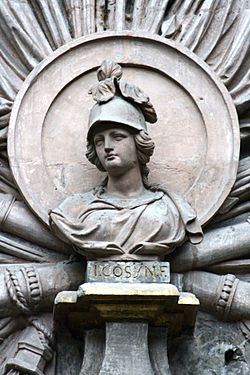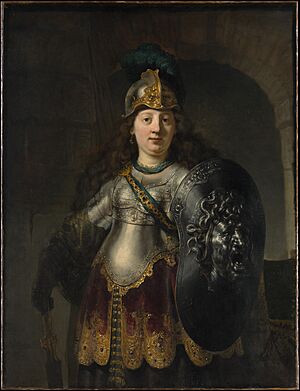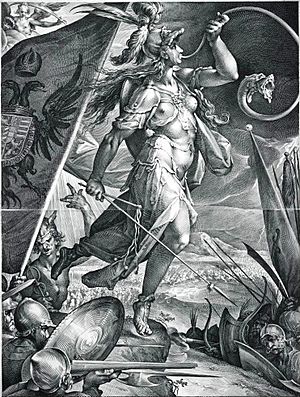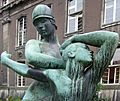Bellona facts for kids
Quick facts for kids Bellona |
|
|---|---|
| goddess of the destructive and belligerent aspects of war | |

A bust of Bellona by Jean Cosyn, a 1697 victory celebration over a Brussels doorway
|
|
| Abode | Mount Olympus |
| Symbol | Military helmet |
| Consort | Mars |
| Greek equivalent | Nerio, Enyo, Cappadocian Ma |

Bellona was an ancient Roman goddess of war. She is often shown wearing a military helmet and carrying a sword, spear, or shield. Sometimes, she holds a torch or whip as she rides into battle in a chariot pulled by four horses.
Important meetings of the Roman Senate about wars with other countries were held in her temple in Rome. Her special day, or festival, was celebrated on June 3. She was often seen as the wife of Mars, the Roman god of war, or his Greek equal, Ares.
Bellona: An Ancient War Goddess

Bellona was originally called Duellona in the Italic languages. She was an old Sabine goddess of war. People linked her to Nerio, who was the partner of the war god Mars. Later, she was also connected to Enyo, her Greek equivalent.
Her first temple in Rome was built in 296 BCE. Her festival was celebrated there every year on June 3. Her priests were known as Bellonarii. They would perform a special ceremony on March 24, which was called the "day of blood" (dies sanguinis). During this ceremony, they would wound their own arms or legs as an offering to her. Because of this practice, Bellona became linked to Ma, a goddess from Cappadocia in Asia Minor.
The area in Rome where Bellona’s temple stood was called the Campus Martius. This area had a special status, meaning it was considered outside the main city. Ambassadors from other countries, who were not allowed inside Rome itself, would stay in this complex. The area around Bellona's temple was seen as representing foreign land.
This was where the Roman Senate met with ambassadors and welcomed victorious generals before their big parades called Triumphs. It was also where the Senate held important meetings about foreign wars. Next to the temple was a special war column (columna bellica). This column marked the boundary of Rome. To declare war on a faraway country, a priest would throw a javelin over this column. This symbolic act showed that Rome was starting a war.
Images for kids
-
Bellona on the badge of the Volunteer Training Corps in World War I
See also
 In Spanish: Bellona para niños
In Spanish: Bellona para niños










